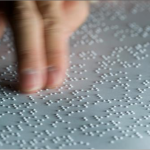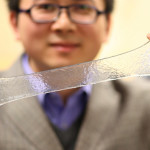The detection of poison gas is critical in industry. Gas chromatographs are big and expensive, so sensor developers have been looking for years to find ways to detect both odors and harmful gases in a small, fast-acting, low-power, and lightweight device. Scientists may have found a way to end-run the problem. A team at MIT has developed a low-cost way to detect lethal gas … [Read more...]
MIT Researchers Want to Open the World for Blind, Visually Impaired People
For people who are blind or visually impaired, reading is too often a matter of dependence on other people, either as readers or as translators into Braille. More than 3 million books are published annually in the U.S; only a small percentage of those are also published in Braille. Researchers at MIT are tackling the problem with the prototype FingerReader, which would allow … [Read more...]
Bandages Get a Hydrogel Upgrade
MIT's got an interest in wearable technology with the creation of a “smart Band-Aid,” a flexible, adhesive hydrogel that can carry health sensors and monitor a patient’s condition. With a reservoir in the gel, the dressing can also deliver medication and warn when the medication level getting low. Researchers think one of the first uses for the hydrogel -- which is 90 … [Read more...]
Verge Profiles MIT’s Sandy Pentland, “Father of Wearables”
The Verge has a terrific longform profile of Sandy Pentland, of MIT's Human Dynamics Lab. Most strands of the wearables revolution track back to Pentland, particularly (and most famously) Thad Starner, who led the original Google Glass project. It's a long read that touches a lot of bases, most particularly privacy: Any technology that can capture and transmit your … [Read more...]


